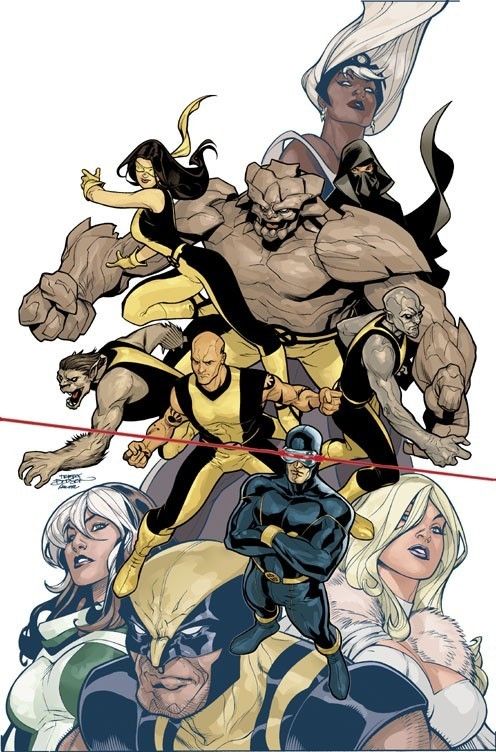While Guggenheim came to Marvel with a largely well-received "Wolverine" storyline during Civil War, the critical reception to his writing has been all over the place since then. I certainly enjoyed his first arc on "Amazing Spider-Man", so I was naturally interested to see how he tackled the latest addition to the X-Men line.
"Young X-Men" #1 opens with the Hellfire Club’s resident cyborg, Pierce, fighting (appropriately enough) a young X-Men team. Almost as soon as he kills one of them, the whole scene is revealed as one of Blindfold’s precognitive visions, which explains why there’s even an X-Men team to speak of -- they haven’t actually formed yet. Elsewhere, Cyclops trots around the globe, accumulating some serious air-miles as he tracks down the few former cast members of "New X-Men" that he’s deemed worthy of appearing in the new title.
If it wasn’t obvious, the sequence is largely an homage to the opening of "Giant Size X-Men" #1, and why not? As a device, it both recalls the X-Men’s mythology and introduces the cast as if they were new characters, without disregarding existing continuity. After recruiting Rockslide (who then gets Blindfold onto the team by employing some perfectly valid predestination logic) Cyclops takes the team to their new training room the, er, Danger Cave, before explaining that now that the Messiah Complex Baby is gone, they’re the last generation of mutants, and they’re also going to be the new X-Men team. Their mission is to take down mutant threats, starting with the new Brotherhood, a team lead by the Lord Imperial of the Hellfire Club, and his former team-mates. That is, Sunspot, Karma, Cannonball and Magma. The original New Mutants!
The twist works fairly well for both new and old readers -- Sunspot’s connection to the Hellfire Club was a thread throughout the original "New Mutants" and "X-Force" runs, and many of the cast members from those titles ended up as instructors in “New X-Men” so there’s a double level of resonance in choosing them as the first villains. That said, some other elements of the plot are all over the place. . .
There’s little reason to believe that the Messiah Complex baby was a one-off, so Cyclops’ assertion that the kids are the "last generation of mutants" is nothing short of baffling. Pre-Messiah Complex, I would’ve bought it, but now? Not so much. Likewise, the idea that Cyclops is forming a second squad to tackle threats seems bizarre. Why isn’t he regrouping the adult X-Men? Why isn’t he asking X-Force to go after the Hellfire Club? I can find no satisfying answer to these questions. Finally, Blindfold’s vision of an unrevealed team member dying would be a fairly straightforward concern, were it not for the fact that over the last 2 years, the entire gimmick of "New X-Men" was practically that it was stuffed with cannon fodder. Do the young X-Men really need to face death again so soon?
Nonetheless, I'm a sucker for a good mystery -- if I had to put money on who died, I'd say Rockslide, if only because he had a big speech in this issue about how invincible he was. If true, that’ll be a shame because he’s consistently been one of the most likable and well-defined cast members of "New X-Men."
Overall, "Young X-Men" hasn’t really lived up to the standards set by the rest of the X-Men relaunch title -- it’s fairly telling that the most interesting element of the book involves the return of the original New Mutants team. It’s not a complete misfire by any means, but I'm ultimately left with lot of questions about what the role of "Young X-Men" actually is. Any way you look at it, that’s a bad way for a new series to start.

